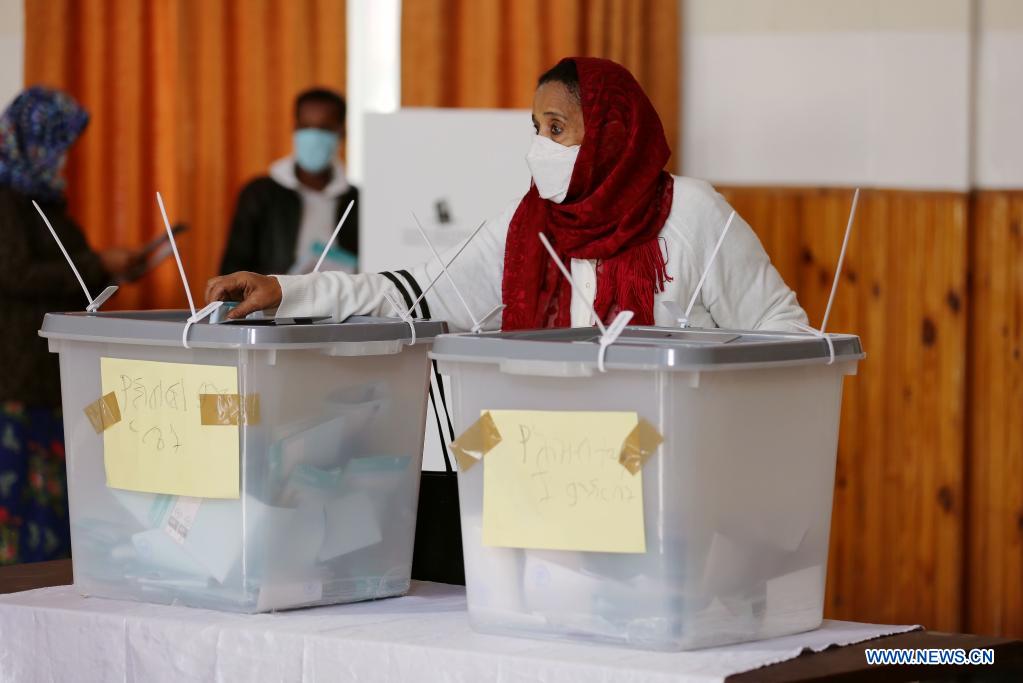
A voter casts her ballot at a polling station in Addis Ababa, Ethiopia, on June 21, 2021. Millions of Ethiopians went to the polls Monday to vote for the twice delayed sixth general elections as maintaining national peace and stability took center stage. (Xinhua/Wang Ping)
ADDIS ABABA, June 21 (Xinhua) -- Millions of Ethiopians went to the polls Monday to vote for the twice delayed sixth general elections as maintaining national peace and stability took center stage.
Azeb Moges, a 62-year-old retiree, came out early in the morning to vote in a polling station in the Bole neighborhood of Addis Ababa, Ethiopia's capital.
"My hope is that this chaotic situation is corrected and to see a peaceful country and for us to leave and enter our houses peacefully," Moges said, as she waited for hours to cast a ballot due to the crowd gathering at the polling station.
Ethiopia is currently convulsed by war in the country's northern Tigray region, as well as low-level insurgencies in the country's Oromia and Benishangul-Gumuz regional states.
Moges came with her daughter, Sara Tesfaye, 28 and a first time voter, in a sign of how many Ethiopians have put hope in the East African country's sixth general elections.
"I am happy to vote, because I think this is my duty as an Ethiopian citizen. We came early to ensure that we vote early," Tesfaye told Xinhua. "People want solutions, for us to find solutions through dialogue, for us to go forward, for the hate to stop, for us to head into one goal, and for us to start discussing the solution rather than just complain."
Bayenes Birara, 57, who is a tailor and sixth time voter, is hoping for better times after the general elections.
"My wish is for the country to be peaceful and for us to reach growth," Birara said.
While millions of citizens were able to vote in the sixth general elections, other more powerful figures also came early and voted.
Ethiopian President Sahle-Work Zewde cast her first-ever vote in the Kirkos district of Addis Ababa.
"I am very happy as I cast my vote and conducted my citizenship rights. This is my first time voting as I spent much of my time abroad," Zewde told journalists as she left the polling station. "As I previously affirmed to the parliament concerning the need to conduct free and fair elections, I hope this one falls in that category."
Ethiopia's sixth general elections are being observed by several regional, continental and international organizations, including the African Union (AU) which has deployed an election observer mission to observe the integrity of the election.
The AU election observer team to Ethiopia, headed by the former Nigerian President Olusegun Obasanjo, has been in Ethiopia for the last five days observing the electoral process.
Speaking to journalists earlier Monday, Obasanjo commended the discipline and energy put into organizing the election despite facing multiple challenges.
"Preparations (for the elections), in spite of the handicaps, have gone reasonably well; and today I have gone out around Addis Ababa almost half a dozen polling stations and what I have seen is orderliness, some of the voters have been out as early as 6:00 am some even before 6:00 am," the former Nigerian president said.
The twice postponed Ethiopian general elections are being held in seven of the 10 regional states, with voters expected to choose candidates vying for 440 of the 547 parliamentary seats in the East African country.
The National Electoral Board of Ethiopia (NEBE) has previously disclosed security and logistical challenges as well as faulty ballots and electoral malpractices have forced it to postpone voting in 107 of the 547 parliamentary seats.
Ethiopians are expected to choose candidates from 46 regional and national parties, with the ruling Prosperity Party (PP) widely expected to be favored to win the polls as preliminary results of the voting are set to be announced within five days.
Under Ethiopia's parliamentary government system, the Prime Minister who is the highest authority of the land is selected from the party that wins the most seats at federal parliament level and will be sworn in after parliamentary vote. Enditem